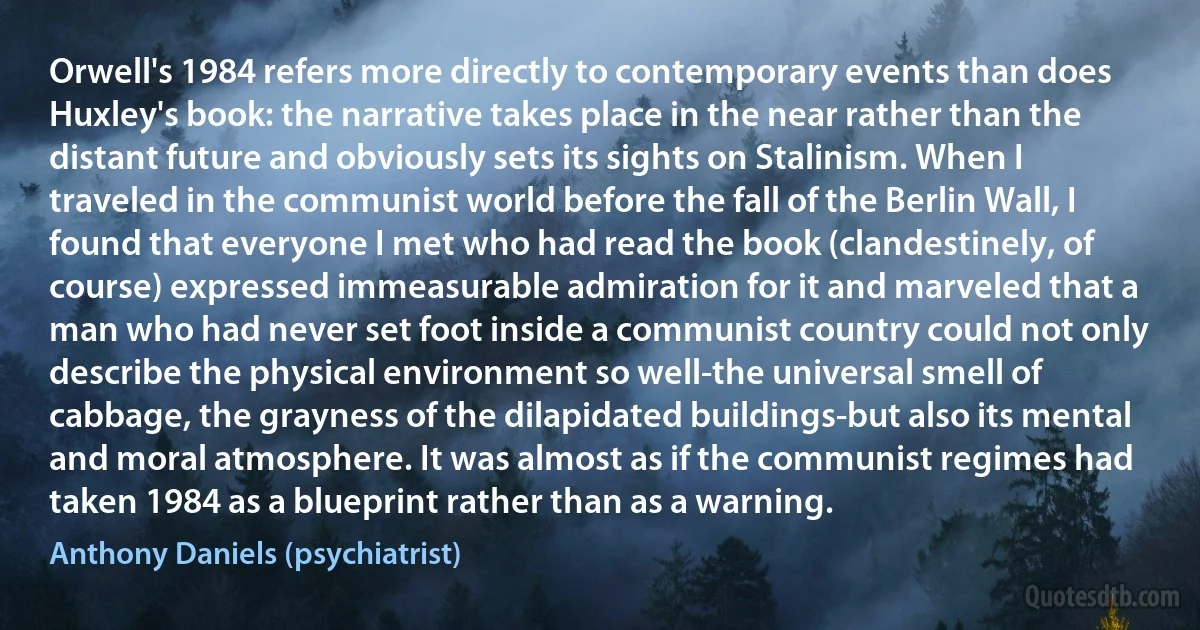
Orwell's 1984 refers more directly to contemporary events than does Huxley's book: the narrative takes place in the near rather than the distant future and obviously sets its sights on Stalinism. When I traveled in the communist world before the fall of the Berlin Wall, I found that everyone I met who had read the book (clandestinely, of course) expressed immeasurable admiration for it and marveled that a man who had never set foot inside a communist country could not only describe the physical environment so well-the universal smell of cabbage, the grayness of the dilapidated buildings-but also its mental and moral atmosphere. It was almost as if the communist regimes had taken 1984 as a blueprint rather than as a warning.
Anthony Daniels (psychiatrist)Related topics
almost atmosphere berlin blueprint book cabbage communist contemporary country course everyone fall found foot future immeasurable inside man met narrative near place read set smell take universal wall warning world stalinism 1984Related quotes
Like Fichte, Brentano had one simple and powerful insight. He declared: there is a basic difference between a mental and physical act. if I slip on the snow and fall flat on my back, that is an unintentional physical act. But there is no such thing as an unintentional mental act. When I think, I have to think about something; I have to focus my mind on it. You could compare all mental acts (thinking, willing, loving, trying to remember something) to a searchlight beam stabbing into the darkness. There is an element of will, of 'intentionality,' in all mental activity. So it is quite inaccurate to compare mental activity to chemistry, or to a kind of drifting, like leaves on a stream. It flows purposefully or not at all.

Colin Wilson
The male is completely egocentric, trapped inside himself, incapable of empathizing or identifying with others, or love, friendship, affection or tenderness. He is a completely isolated unit, incapable of rapport with anyone. His responses are entirely visceral, not cerebral; his intelligence is a mere tool in the services of his drives and needs; he is incapable of mental passion, mental interaction; he can't relate to anything other than his own physical sensations. He is a half-dead, unresponsive lump, incapable of giving or receiving pleasure or happiness; consequently, he is at best an utter bore, an inoffensive blob, since only those capable of absorption in others can be charming.

Valerie Solanas
The structure of the nobility is changed along with that of the state, but it preserves its continuity with the past intact. Knighthood, on the other hand, as the exclusive warrior-class and upholder of secular culture, decays completely. The process is protracted and the ideals of chivalry do not lose their alluring splendour from one day to the next-least of all in the eyes of the middle classes. But behind the scenes everything is set for the fall of Don Quixote.-The decline of the knighthood has been connected with the new methods of warfare introduced in the late Middle Ages, and it has been pointed out that the heavily accoutred cavalry suffered a severe reverse whenever they met the infantry of the new mercenary armies or the foot of the peasant brigades.

Arnold Hauser
I give you three examples: first, medical space research may open up new understanding of man's relation to his environment. Examinations of the astronaut's physical, and mental, and emotional reactions can teach us more about the differences between normal and abnormal, about the causes and effects of disorientation, about changes in metabolism which could result in extending the life span. When you study the effects on our astronauts of exhaust gases which can contaminate their environment, and you seek ways to alter these gases so as to reduce their toxicity, you are working on problems similar to those in our great urban centers which themselves are being corrupted by gases and which must be clear.

John F. Kennedy
An Asian peasant who labors through all of his waking hours, with tools created in Biblical times-a South American aborigine who is devoured by piranha in a jungle stream-an African who is bitten by the tsetse fly-an Arab whose teeth are green with decay in his mouth-these do live with their 'natural environment,' but are scarcely able to appreciate its beauty. Try to tell a Chinese mother, whose child is dying of cholera: 'Should one do everything one can? Of course not.' Try to tell a Russian housewife, who trudges miles on foot in sub-zero weather in order to spend hours standing in line at a state store dispensing food rations, that America is defiled by shopping centers, expressways and family cars.

Ayn Rand
